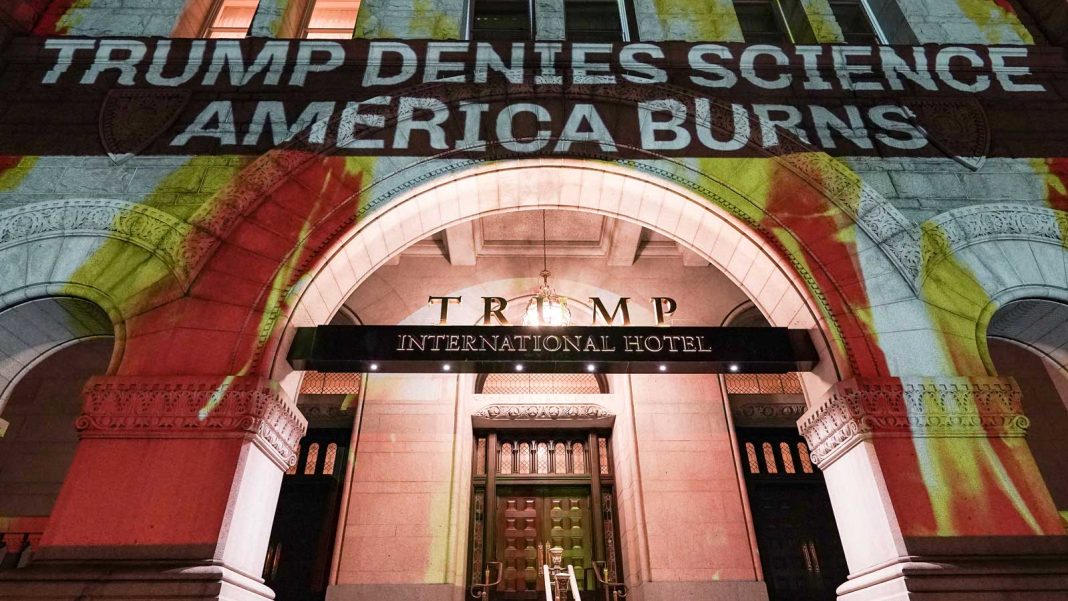The last time Donald Trump was president, his administration pulled the United States out of the Paris Climate Agreement, removed information about climate change from agency websites, and buried the findings of federal scientists. As Trump prepares to return to office, the nonprofit Climate Science Legal Defense Fund, which provides free legal and educational support to researchers facing harassment and intimidation for their work, is gearing up for a high-stakes protracted struggle to protect scientists.
I sat down last week with Executive Director Lauren Kurtz, a New York-based lawyer, to ask about their preparations.
Masters: Have you seen an increase in the demand for the services of the Climate Science Legal Defense Fund since the election?
Kurtz: Yes, we’re already responding to an increasing number of scientists reaching out. We were typically hearing from about one scientist per week preelection, which was already putting us on track to beat our record for most scientists helped in a year. Now, postelection, we’re hearing from three to four scientists per week. (Sample questions: what sorts of activism activities a federal scientist can undertake without risking losing their employment; how to deal with a potential job reassignment in a second Trump administration; what are the risks of publishing a paper and other work related to climate attribution research?)
Masters: What are the biggest areas of concern that you’re hearing?
Kurtz: We’ve been talking to current and former federal climate scientists about where they foresee the biggest issues in the next administration. The main areas of discussion thus far have been: the Trump administration’s plans to make it easier to fire federal employees, including federal scientists; the potential for the Trump administration to shut down departments / reassign scientists / relocate scientists to unfavorable offices or similar; the potential for the Trump administration to censor scientific reports or misrepresent scientific findings (which happened in spades last time around) — and the actions that can potentially be taken to contest these actions. It’s been a lot of legal research and we’re only just beginning.

Masters: Does your organization have the resources for what’s coming?
Kurtz: We’re going to need another lawyer due to the already-increased demand. We’re working to hard fundraise accordingly, and although I’m hopeful that we’ll be able to raise what we need to meet the moment, any donations are always welcome.
Masters: How is what scientists are facing now different from the situation four years ago during the first Trump administration?
Kurtz: The Trump administration is likely to be savvier about how they tackle their goals than in 2016. It seemed pretty bad at the time, but now they’ve had four years to prepare, so I think we can anticipate them being much more organized. For example, in October 2020, the Trump Administration issued an executive order that would have stripped protections from civil servants perceived as disloyal to the president and encouraged expressions of allegiance to the president when hiring. This effort is referred to as “Schedule F” because that was the name of the new employment category that the executive order created. Since it was done so late in his term, it took them a while to get it in action, so nothing really came of it. I think we can anticipate they’re going do that very early in this term, which means it may actually be implemented. The other thing I think will be different is that the first time, they broke a lot of norms that we collectively perceived as laws, but they weren’t actually illegal actions. This time around, they’re likely to be more aggressive, and I actually think they will break more laws, in which case it may be easier to challenge those illegal actions.
Masters: Can you give us an example of a climate scientist that you helped out during the first Trump administration?
Kurtz: Well, about 80-90% of the scientists we’ve been representing don’t want their stories made public. But one that does is Dr. Virginia Burkett, a climate scientist with USGS [U.S. Geological Survey], who chaired a prominent White House panel that managed the government’s main, multiagency climate program. Between 2017 and 2020, Dr. Burkett was demoted, then removed, from her leadership position, in retaliation for calling out attempts by political appointees to downplay and misrepresent the scale and impact of climate change. Dr. Burkett has since been reinstated to a senior-level position. An article in Nature has the full story.
Read: Michael Mann beat his defamers. But climate scientists are still under attack.
Only 28% of U.S. residents regularly hear about climate change in the media, but 77% want to know more. Help us bring climate news to more people.


